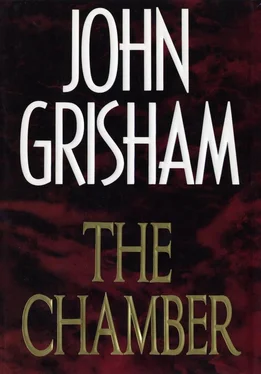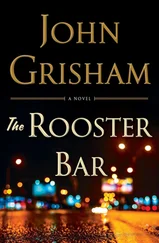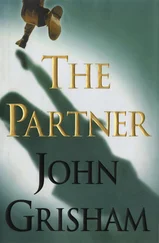The fact that Cayhall’s car had been left at the truck stop in Cleveland was never discovered by the police or FBI. During his first phone call from jail, he had instructed his wife to get his son, Eddie Cayhall, and drive to Cleveland immediately for the car. This was a significant piece of luck for the defense.
But the strongest argument presented by Clovis Brazelton was simply that no one could prove that his clients conspired to do anything, and how in the world can you, the jurors of Nettles County, send these two men to their deaths?
After four days of trial, the jury retired to deliberate. Clovis guaranteed his clients an acquittal. The prosecution was almost certain of one. The Kluckers smelled victory, and increased the tempo on the front lawn.
There were no acquittals, and there were no convictions. Remarkably, two of the jurors boldly dug in their heels and pressed to convict. After a day and a half of deliberations, the jury reported to the judge that it was hopelessly deadlocked. A mistrial was declared, and Sam Cayhall went home for the first time in five months.
The retrial took place six months later in Wilson County, another rural area four hours from Greenville and a hundred miles from the site of the first trial. There were complaints of Klan harassment of prospective jurors in the first trial, so the judge, for reasons that were never made clear, changed venue to an area crawling with Kluckers and their sympathizers. The jury again was all-white and certainly non-Jewish. Clovis told the same stories with the same punch lines. Mr. Carson Jenkins told the same lies.
The prosecution changed strategy a bit, to no avail. The district attorney dropped the capital charges and pressed for a conviction for murder only. No death penalty, and the jury could, if it so chose, find Cayhall and Dogan guilty of manslaughter, a much lighter charge but a conviction nonetheless.
The second trial had something new. Marvin Kramer sat in a wheelchair by the front row and glared at the jurors for three days. Ruth had tried to watch the first trial, but went home to Greenville where she was hospitalized again for emotional problems. Marvin had been in and out of surgery since the bombing, and his doctors would not allow him to watch the show in Nettles County.
For the most part, the jurors could not stand to look at him. They kept their eyes away from the spectators, and, for jurors, paid remarkable attention to the witnesses. However, one young lady, Sharon Culpepper, mother of twin boys, could not help herself. She glanced at Marvin repeatedly, and many times their eyes locked. He pleaded with her for justice.
Sharon Culpepper was the only one of the twelve who initially voted to convict. For two days she was verbally abused and harangued by her peers. They called her names and made her cry, but she doggedly held on.
The second trial ended with a jury hung eleven to one. The judge declared a mistrial, and sent everybody home. Marvin Kramer returned to Greenville, then to Memphis for more surgery. Clovis Brazelton made a spectacle of himself with the press. The district attorney made no promises of a new trial. Sam Cayhall went quietly to Clanton with a solemn vow to avoid any more dealings with Jeremiah Dogan. And the Imperial Wizard himself made a triumphant return to Meridian where he boasted to his people that the battle for white supremacy had just begun, good had defeated evil, and on and on.
The name of Rollie Wedge had been uttered only once. During a lunch break in the second trial, Dogan whispered to Cayhall that a message had been received from the kid. The messenger was a stranger who spoke to Dogan’s wife in a hallway outside the courtroom. And the message was quite clear and simple. Wedge was nearby, in the woods, watching the trial, and if Dogan or Cayhall mentioned his name, their homes and families would be bombed to hell and back.
Ruth and Marvin Kramer separated in 1970. He was admitted to a mental hospital later that year, and committed suicide in 1971. Ruth returned to Memphis and lived with her parents. In spite of their problems, they had pressed hard for a third trial. In fact, the Jewish community in Greenville was highly agitated and vocal when it became apparent that the district attorney was tired of losing and had lost his enthusiasm for prosecuting Cayhall and Dogan.
Marvin was buried next to his sons. A new park was dedicated to the memory of Josh and John Kramer, and scholarships were established. With time, the tragedy of their deaths lost some of its horror. Years passed, and Greenville talked less and less about the bombing.
Despite pressure from the FBI, a third trial did not materialize. There was no new evidence. The judge would no doubt change venue again. A prosecution looked hopeless, but still the FBI did not quit.
With Cayhall unwilling and Wedge unavailable, Dogan’s bombing campaign fizzled. He continued to wear his robe and make his speeches, and began to fancy himself as a major political force. Journalists up North were intrigued by his blatant race-baiting, and he was always willing to put on his hood and give outrageous interviews. He was mildly famous for a brief period, and he enjoyed it immensely.
But by the late 1970s, Jeremiah Dogan was just another thug with a robe in a rapidly declining organization. Blacks were voting. The public schools were desegregated. Racial barriers were being struck down by federal judges throughout the South. Civil rights had arrived in Mississippi, and the Klan had proven pitifully inept in keeping Negroes where they belonged. Dogan couldn’t draw flies to a cross-burning.
In 1979, two significant events occurred in the open but inactive Kramer bombing case. The first was the election of David McAllister as the district attorney in Greenville. At twenty-seven he became the youngest D.A. in the state’s history. As a teenager he had stood in the crowd and watched the FBI pick through the rubble of Marvin Kramer’s office. Shortly after his election, he vowed to bring the terrorists to justice.
The second event was the indictment of Jeremiah Dogan for income tax evasion. After years of successfully dodging the FBI, Dogan got sloppy and ran afoul of the IRS. The investigation took eight months and resulted in an indictment that ran for thirty pages. According to it, Dogan had failed to report over a hundred thousand dollars between 1974 and 1978. It contained eighty-six counts, and carried a maximum of twenty-eight years in prison.
Dogan was dead guilty, and his lawyer (not Clovis Brazelton) immediately began exploring the possibility of a plea bargain. Enter the FBI.
Through a series of heated and angry meetings with Dogan and his lawyer, a deal was offered by the government whereby Dogan would testify against Sam Cayhall in the Kramer case, and in return he would serve no time in jail for tax evasion. Zero days behind bars. Heavy probation and fines, but no jail. Dogan had not spoken to Cayhall in over ten years. Dogan was not active in the Klan anymore. There were lots of reasons to consider the deal, not the least of which was the issue of remaining a free man or spending a decade or so in prison.
To prod him along, the IRS attached all of his assets, and planned a nice little fire sale. And to help with his decision, David McAllister convinced a grand jury in Greenville to indict him and his pal Cayhall once again for the Kramer bombing.
Dogan caved in and jumped at the deal.
After twelve years of living quietly in Ford County, Sam Cayhall once again found himself indicted, arrested, and facing the certainty of a trial and the possibility of the gas chamber. He was forced to mortgage his house and small farm to hire a lawyer. Clovis Brazelton had gone on to bigger things, and Dogan was no longer an ally.
Читать дальше












